Software for åpenhetsloven
Vår programvare gir deg full oversikt over leverandører og partnere - og gjør det enkelt å risikovurdere dem, samt hente inn svar og dokumentasjon.
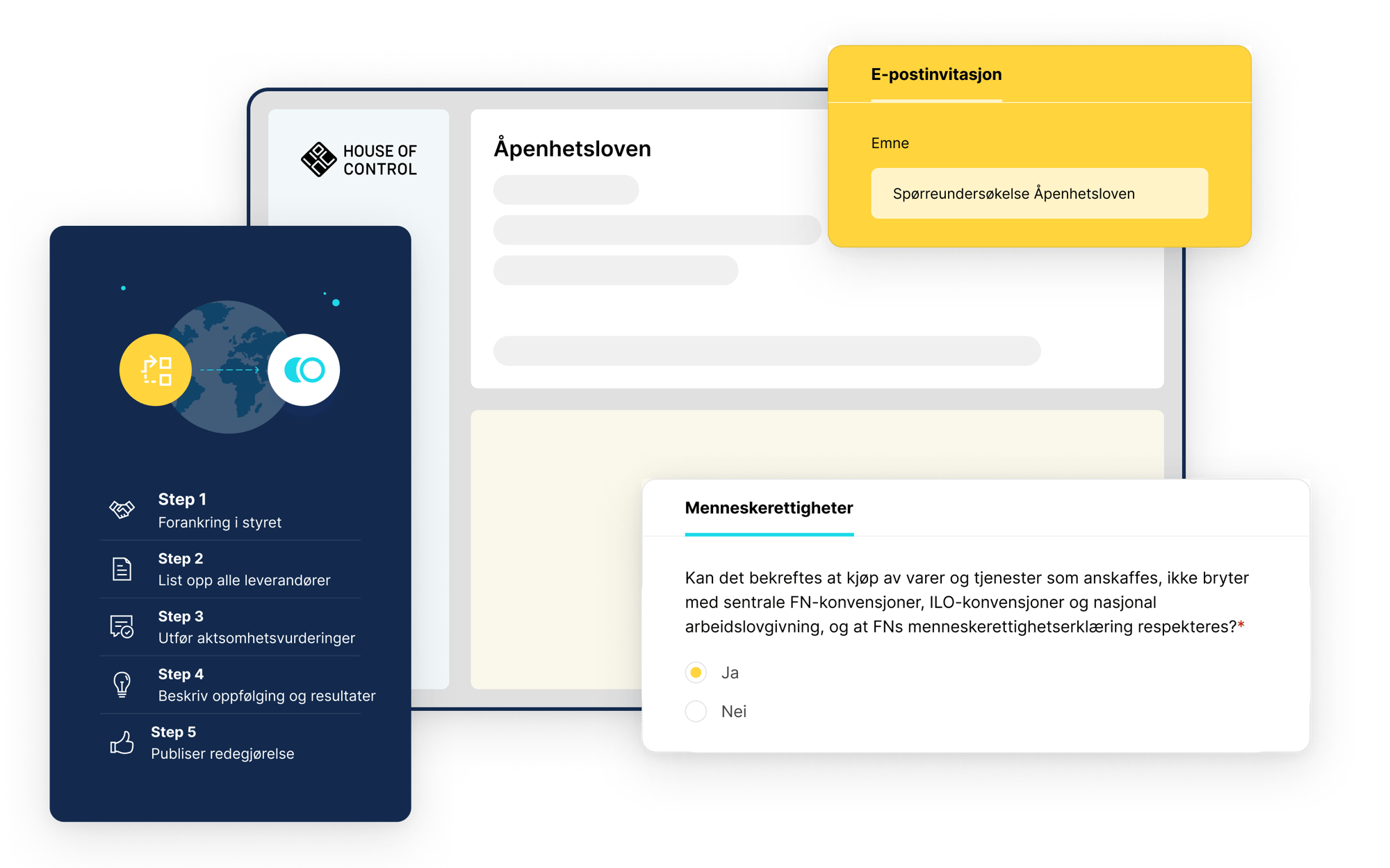
Book en demo
- Full oversikt over leverandører
- Effektiv risikovurdering
- Innhenting av dokumentasjon
- Tilpassede spørreskjemaer
- Rapportering
Noen av våre kunder
Kundehistorier
Her finner du våre kundehistorier som viser hvordan våre løsninger har skapt bemerkelsesverdige resultater på tvers av ulike industrier og selskaper. Utforsk noen få eksempler på den positive effekten vi har oppnådd sammen med våre kunder.
-
Den ansvarligheten som kundene og andre interessenter forventer av oss er tett knyttet til den tilliten vi får. Vi er og skal være et selskap som følger lover og har orden i sysakene. Det er viktig for oss og det er viktig for kunder, eiere og omgivelsene at vi opptrer ordentlig og at vi bruker de mulighetene vi har til å påvirke i riktig retning.
Elin Hessen
Leder bærekraft - Wattn
-
Med full oversikt over alle leverandørene er vi bevisst alle avtalene vi har og innkjøpene vi gjør. La meg si det slik: Det var skremmende å se hvor mange av innkjøpene som gjøres utenfor eksisterende rammeavtaler. Vi kommer til å spare millionbeløp på en oppstramming.
Ståle Birkeland
Chief Of Operations - Vianor
-
Sommeren 2022 ble åpenhetsloven innført i Norge, og den setter tydelige krav til sikring av anstendige arbeidsvilkår i hele verdikjeden. Siden leverandører og avtaler er tett forbundet, satte vi i Armaturjonsson stor pris på at House of Control lanserte en løsning for åpenhetsloven som gjorde det enkelt å føre prosessen med å etterleve loven.
Thorn Fredrik Hemsen
Administrerende direktør -Armaturjonsson
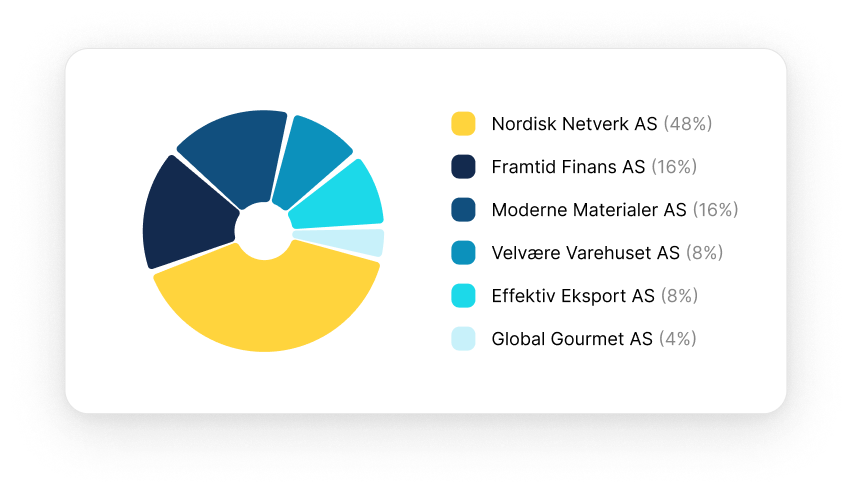
Risikovurderinger av leverandører og partnere
Vår nye funksjon for risikovurderinger hjelper bedrifter med å identifisere og evaluere potensielle brudd på menneskerettigheter og arbeidsforhold i egen virksomhet, samt hos leverandører og andre forretningsforbindelser.
Med denne funksjonen får du tilgang til ferdige vurderinger av landrisiko utført av International Trade Union Confederation, samt miljørisiko fra CSDDD. Disse vurderingene følger automatisk med leverandørene dine inn på partnerkortet, hvor du også kan supplere med dine egne individuelle risikovurderinger.
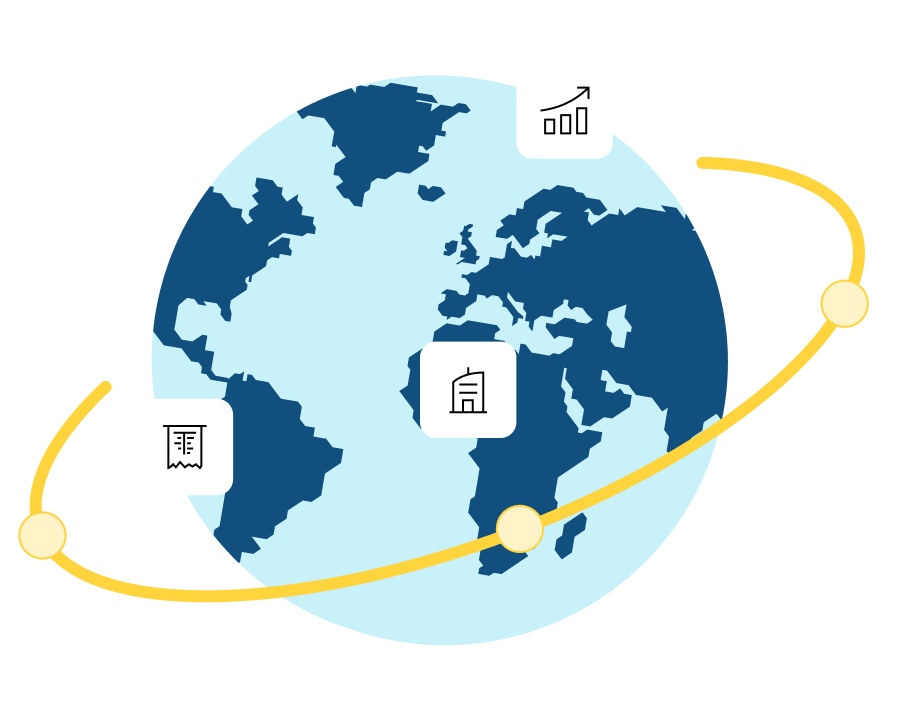
Samle informasjon om leverandører og partnere på ett sted
Viktig informasjon om bedriftens leverandører og andre partnere er ofte spredd på ulike avdelinger, datterselskaper og lokasjoner. Det er som regel krevende å holde informasjonen oppdatert.
Med vår løsning for åpenhetsloven kan du vedlikeholde og oppdatere sentrale data om leverandører. Det kan for eksempel være kontrakter, revisjoner, bekreftelser og aktsomhetsvurderinger - samt endringer i disse.
Løsningen gjør det enkelt for dere å ha kontroll over vurderinger som er gjort såvel som å overholde informasjonsplikten som følger av loven.
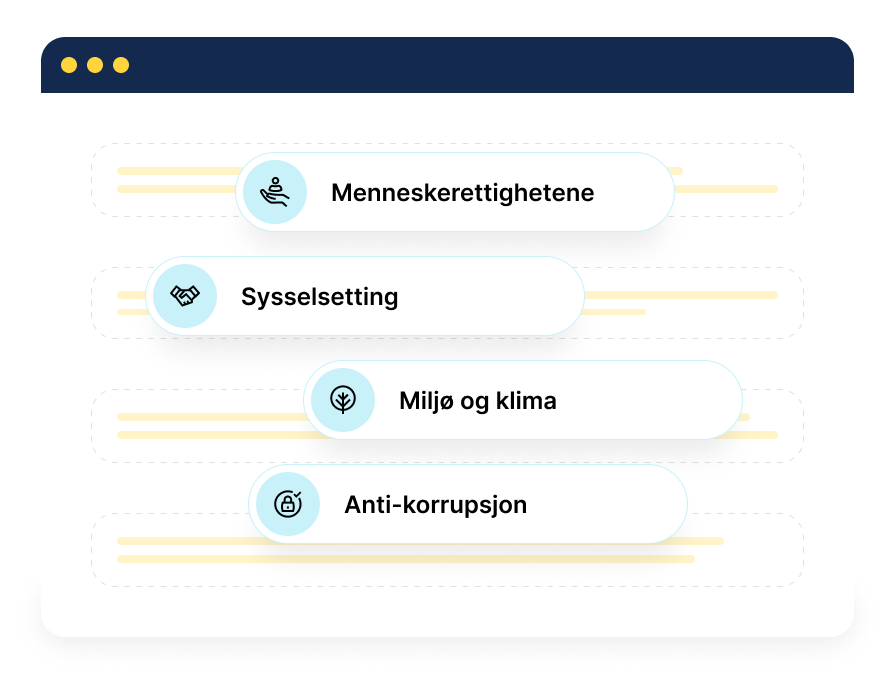
Send ut smarte undersøkelser
Det er raskt og enkelt å sende spørreundersøkelser til leverandører og partnere som en del av aktsomhetsvurderingene.
Programvaren inkluderer ferdige maler med spørsmål om menneskerettigheter, arbeidsforhold, miljø og andre viktige emner.
Du kan legge til emner og bygge nye spørreskjemaer etter behov.
Det er enkelt å distribuere spørreskjemaet fordi kontaktpersoner, e-poster og andre data allerede er registrert på leverandørkortet i løsningen.
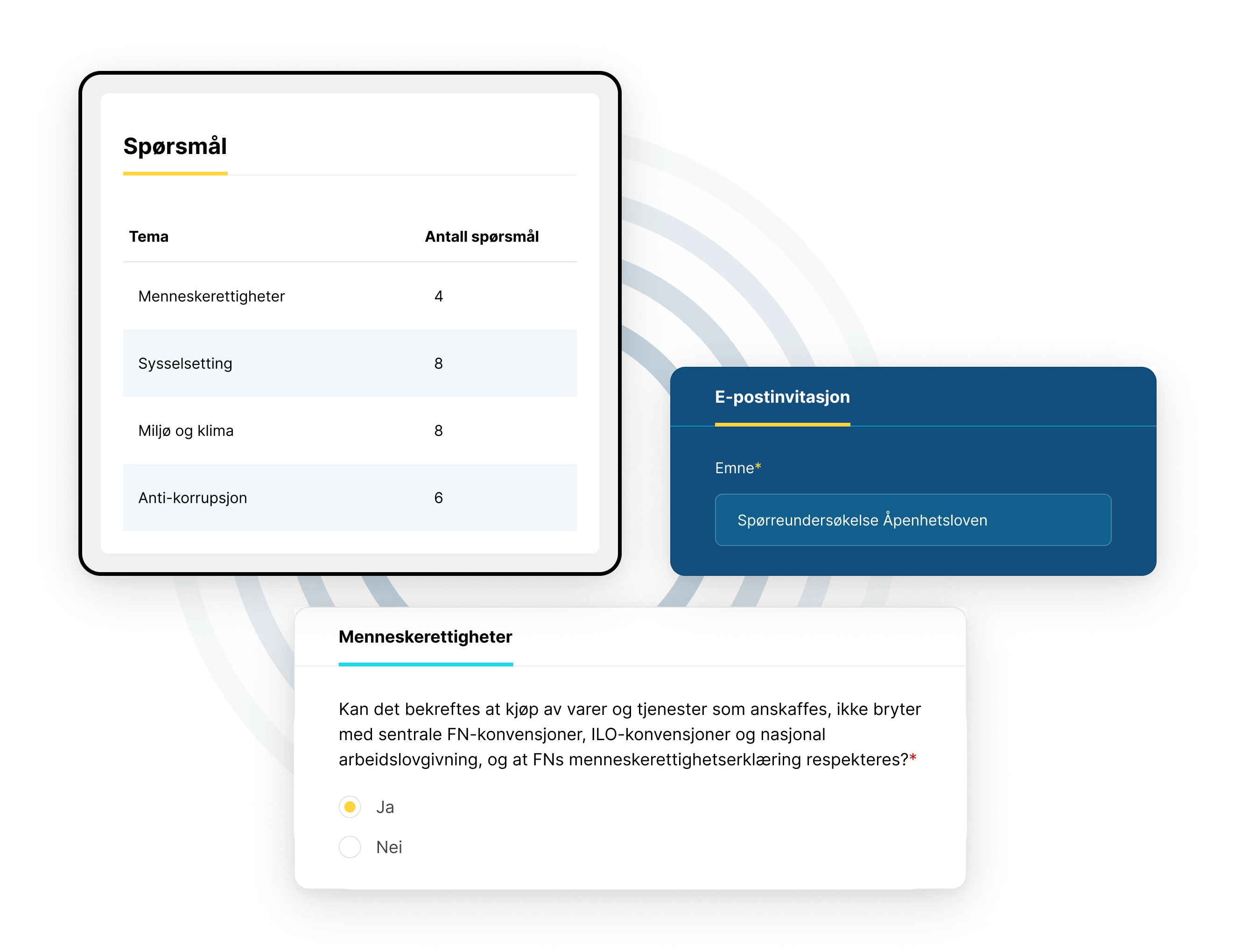
Følg opp leverandører og partnere
Åpenhetsloven innebærer at det er viktigere enn noen gang å samarbeide med leverandører, underleverandører og partnere for å kartlegge og forstå potensiell risiko.
Med programvaren sporer du hvem som har svart på spørreundersøkelser, sender påminnelser og bekrefter at forespørsler om dokumentasjon er besvart.
Svar og filer er enkle å finne i løsningen. Data fra undersøkelsen kan eksporteres til Excel med noen få enkle klikk.
Har du oversikt over dine leverandører og er klar for å etterleve åpenhetsloven?
Rapporteringsfristen er 30. juni.
Vår nyeste generasjon av software for åpenhetsloven har blitt oppgradert med nye funksjoner og forbedret brukervennlighet som gjør det enklere enn noensinne å etterleve lovens krav.
- Leverandørregister
- Risikovurdering
- Spørreundersøkelse
- Aktsomhetsvurderinger
- Redegjørelse
- Rapportering
FAQ
Åpenhetsloven er en norsk lov som trådte i kraft 1. juli 2022. Den pålegger større virksomheter å kartlegge og dokumentere hvordan de ivaretar menneskerettigheter og anstendige arbeidsforhold i leverandørkjeden. Loven krever at virksomheter gjennomfører aktsomhetsvurderinger og publiserer en årlig redegjørelse.
Åpenhetsloven stiller detaljerte dokumentasjonskrav som er krevende å håndtere i Excel og manuelle prosesser. Med en programvare får du bedre kontroll, oversikt og datakvalitet. Løsningen reduserer risikoen for feil og effektiviserer hele prosessen, fra innsamling av informasjon til publisering av årlig redegjørelse.
Programvaren gir et strukturert rammeverk for leverandørkartlegging, aktsomhetsvurderinger og oppfølging. Alt dokumenteres og lagres på ett sted, slik at du enkelt kan hente frem rapporter og redegjørelser.
Ja. Løsningen kan integreres med ERP, kontraktsstyring og andre systemer. Det gir en sømløs arbeidsflyt, reduserer behovet for dobbeltarbeid og sikrer bedre datakvalitet. Vi har integrasjoner mot blant annet Tripletex, Visma.net og Microsoft Dynamics 365, og løsningen tilbyr åpent API som gjør det enkelt å koble til andre systemer.
Datasikkerhet og GDPR-etterlevelse er en integrert del av løsningen. Programvaren er ISO 27001-sertifisert, med ISAE 3402 Type 2-attestasjon som bekrefter våre interne kontroller. Vi følger ISO 27000-rammeverket og ITIL-prosesser for tilgangsstyring, hendelseshåndtering og kontinuitet.
Som en del av Visma-konsernet følger vi strenge standarder for å beskytte sensitiv kontrakts- og finansinformasjon, med en dedikert CISO og DPO som overvåker etterlevelsen.
Du får tett oppfølging gjennom hele implementeringen. Vi hjelper med oppsett og opplæring, og en dedikert Customer Success Manager sørger for at dere alltid har brukerstøtte uten ekstra kostnad. Slik kommer dere raskt i gang og får maksimal verdi ut av løsningen.
Se løsningen live og book en demo
Opplev hvordan vår løsning for åpenhetsloven kan hjelpe din bedrift ved å automatisere risikovurderinger, sikre overholdelse av åpenhetsloven, og gi deg full kontroll over leverandørkjeden. Book en demo i dag.
Abonner på vårt nyhetsbrev
Abonner på vårt nyhetsbrev for å holde deg oppdatert på kontraktstyring, IFRS 16, åpenhetsloven og CSDDD.
